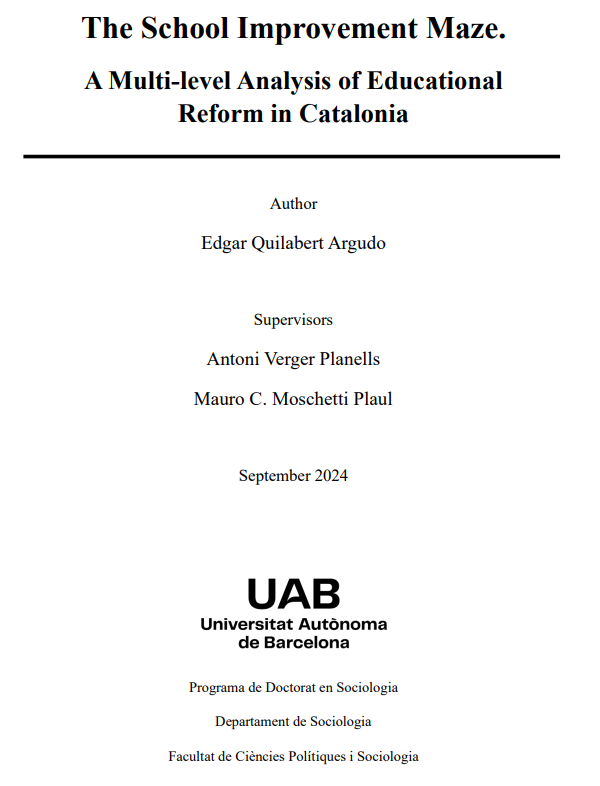Doctoral thesis defense of Egdar Quilabert
The School Improvement Maze. A Multi-level Analysis of Educational Reform in Catalonia

This dissertation examines the adoption, implementation, and effects of educational improvement policies in Catalonia, Spain, where large-scale reforms have focused on driving school improvement by strengthening school autonomy and accountability frameworks. On the autonomy side, the reform initially emphasized decentralizing managerial aspects-staffing, budgeting, organizational structure-, granting principals greater decision-making power over teacher selection and leadership. Though limited emphasis on pedagogical autonomy and innovation at first, it has recently become the focus through the promotion of instructional leadership and competence-based, student-centered teaching practices. On the accountability side, Catalonia adopted a low-stakes assessment framework designed to promote continuous improvement without punitive measures. Standardized tests and inspectorate evaluations were framed as tools for diagnosing performance and encouraging reflection. Like many reforms adopted globally, these efforts aim to stimulate school improvement and enhance educational quality and efficiency by encouraging schools’ alignment with local needs while held accountable for outcomes. However, these policies’ enactment is particularly complex due to their broad, multi-dimensional nature, comprising areas from teaching practices to governance structures. Large-scale reforms aimed at promoting school improvement often face implementation challenges due to resistance, misinterpretation, or capacity issues. Moreover, the interaction between policies can overlap, conflict, or complement one another, with success heavily reliant on how schools perceive and integrate them.
This study’s primary objective is to explore how educational improvement policies are adopted and enacted in Catalonia, focusing on policy-level developments, as well as on-the-ground implementation within schools. To achieve this, it employs a qualitative case study approach, integrating multiple methods and data sources. The policy adoption study combines document analysis with interviews with policymakers to uncover both official stances and informal processes. To analyze implementation, interviews with school actors are the primary method used to explore how they enact these policies within their specific contexts. Quantitative analysis using survey and administrative data complements the interviews, testing issues identified qualitatively and characterizing school contexts. Triangulating methods helps unpack how improvement is framed in policymaking and how schools respond to overlapping or conflicting policy demands.
The findings reveal that educational improvement in Catalonia has evolved over time. Initially focused on results through managerial autonomy, it later expanded to include instructional innovation through pedagogical autonomy, and, to a lesser extent, inclusion. These overlapping mandates have led to school responses diversification. Varying responses are strongly influenced by school-specific contexts—both institutional and socio-economic. While autonomy allows for necessary adaptations, it raises concerns about equity, as school capacity disparities remain unaddressed by the autonomy framework. Additionally, lacking comprehensive teacher training necessary for implementing certain changes makes progress highly dependent on individual schools’ ability to navigate their conditions. The accountability framework often fails to trigger reflexivity, leading to unintended consequences like overemphasis on standardized testing and curriculum narrowing. Under pressure to meet targets, schools may focus on test preparation at the expense of broader educational goals. Although intended as formative, accountability mechanisms are frequently seen as bureaucratic burdens rather than effective tools for improvement.
Regarding policy implications, a key issue with school autonomy is that it assumes all schools can leverage it effectively, but in practice, it can exacerbate inequalities by placing the burden of improvement on under-resourced schools. Moreover, the study finds that ambiguous policy mandates often lead to unintended outcomes, as unclear objectives and incentives result in varied interpretations or rejection of implementation. Without support and training, improvement depends too much on schools' ability to adapt policies.